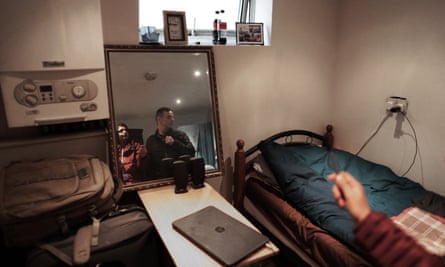Filled nappies, rotting raw meat on a kebab skewer and a mildewed mattress litter the back alley that runs to Anand’s family home in Harrow. To Gareth Jones, a council housing enforcement officer, the stinking hillocks of rubbish are tell-tale signs of illegal, overcrowded dwellings.
Jones picks his way up steps to the front doors of flats constructed hodge-podge over the back of an interwar shopping parade. His colleague, Sheetal Rajani, slaps on one door loudly and Anand, a shop worker answers.
Rajani enters first and points straight to a hole in the ceiling where the smoke alarm should be. “Oh my goodness,” she says, turning into a cramped bedroom. A gas boiler hangs on one side of the bed, a gaping electrical socket with exposed wiring on the other. The ceiling hangs too low and in the back bedroom, where Anand and his wife and child share a small double bed, drying racks clog the space. There are fire risks, the danger of carbon monoxide poisoning, breaches of building regulations and possible overcrowding. The bill for the privilege of living here: £1,200 a month.
 View image in fullscreenAnand and his family’s home poses multiple serious risks to their health. Photograph: Martin Godwin/The Guardian
View image in fullscreenAnand and his family’s home poses multiple serious risks to their health. Photograph: Martin Godwin/The Guardian
“Landlord make money only,” says Anand. “That’s it.”
“We’re here to help you,” says Rajani. “We want you to live in good conditions.”
Rajani and Jones are on the frontline of a nationwide housing safety crisis, simmering for years, but now finally attracting attention of the housing secretary Michael Gove after the scandalous death of two-year-old Awaab Ishak in Rochdale. He died from respiratory failure caused by chronic mould that was not treated by the landlord. This week it was reported two infants in south-east London have been hospitalised after living in a mouldy council flat. Greenwich council said it has given the young family medical priority to move. Cold weather and soaring energy bills are likely to worsen the problem of mould. One in 10 private rented homes have damp, according to the last English Housing Survey.
After reassuring Anand, Rajani begins the hunt for the landlord asking in newsagents and snack bars, flashing her council ID like a police badge. She will track him down, and issue an enforcement notice. In this part of Harrow, the borough requires landlords to be licensed and if they are not they can be fined £5,000.
“It’s definitely a category one,” she says, alluding to the government’s risk ratings for housing. It means Anand’s home – where a child is being brought up – is “serious and immediate risk to a person’s health and safety”.
In 2021 3.4m homes in England failed to meet the government’s “decent homes standard” – equivalent to 14% rising to almost one in four private rented homes. And 2.2m homes feature at least one category one hazard.
In Harrow, there have been an increasing number of complaints.
“Energy is so expensive at the moment that the last thing you want to do is waste it opening the windows,” Jones says, adding that others keep the heating off.
Rooms in unlicensed houses of multiple occupation (HMO) rent from £600 a month to £1,000 if they have an en suite bathroom. “It’s big business,” says Rajani.
In another part of the borough she slaps the door of another house that has attracted complaints. When a young woman answers and says the house is occupied by “a family”, Rajani is sceptical. The occupants, all young adults with very little furniture (some sleep on the floor) claim there are five of them. But in the bathroom there are 10 toothbrushes. There is penetrating damp and the home costs them a combined £2,000 a month. It is probably overcrowded and there are fire hazards. The inspectors take the landlord’s number.
As we walk between inspections Jones explains that a spate of recent cases has involved homes occupied by families with leaking roofs or no electricity and the inspectors have been able to take the properties out of use and get people rehoused somewhere safe.
“It’s one of the reasons I love the job so much,” said Jones. “You’re making a difference to people’s lives.”



